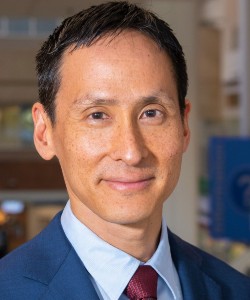In Pursuit of the Practice of Personalized and Patient-Centered Perioperative Pain Management
Cite as: Chin K. In pursuit of the practice of personalized and patient-centered perioperative pain management. ASRA Pain Medicine News 2024;49. https://doi.org/10.52211/asra020124.003.
On March 21-23, 2024, at the Hilton Bayfront in San Diego, CA, ASRA Pain Medicine will hold its 49th Annual Regional Anesthesiology & Acute Pain Medicine Meeting. The planning committee and ASRA Pain Medicine staff have been hard at work putting together a rich program designed around this year’s theme of “Precise, Practical, Personalized, and Patient-Centered” perioperative pain management, and we invite you to join us for three days of sharing and learning.
Precise: Two decades ago, ultrasound imaging opened the way to a level of precision in regional anesthesia that was previously unimaginable, but that we now take for granted. Rather than plateauing, the boundaries of regional anesthesia continue to expand, not just in terms of new targets and applications for blocks, but also in how we modulate the transmission and perception of pain in our patients. We are refining our use of established techniques, and the recipes for local anesthetic mixtures that we inject through our precisely-placed needles. Our armamentarium for treating acute pain now also includes modalities such as cryotherapy and peripheral nerve stimulation. Join us as we explore these exciting new frontiers in the refresher course lectures, parallel sessions, and hands-on workshops led by the leading researchers and clinical experts within our community.
Practical: My hope is that attendees will leave this meeting not just with renewed excitement about our subspecialty, but also with new knowledge and skills that can be immediately put into practice. With that in mind, we have woven a pragmatic thread through the program, featuring high-yield topics and techniques wherever possible. Live on-stage demonstrations will bring these to life (don’t miss the “Hocus POCUS” session!), and the workshops will offer more in-depth and hands-on learning opportunities. This includes simulators for thoracic epidural and paravertebral blocks, sphenopalatine/pterygopalatine blocks, and crisis management. At the same time, we acknowledge the fiscal and regulatory realities of the current health care environment. To address this, we have gathered several experts to share their insights on developing and managing a practice that incorporates regional anesthesia and acute pain management in an efficient and effective manner. These are sprinkled throughout the meeting in a variety of formats, including lectures, a problem-based learning discussion, and an interactive session. I am also excited to announce that Dr. Jesse Ehrenfeld, president of the American Medical Association (AMA) and professor of anesthesiology at the Medical College of Wisconsin, will be speaking to us at a special session on Friday on opportunities for the advancement of our specialty and the role that the AMA is playing in this.
Personalized: Even as we grapple with the realities of bundled health care and standardization of health care delivery, we should not lose sight of the fact that we are all unique individuals with a unique set of life circumstances. The concept of personalizing and customizing care to patients and their needs is a key theme in this meeting; be it choosing the optimal block technique from amongst the myriad options available or crafting a specific recipe of multimodal analgesics. In addition, we hope that the topics offered at the meeting will allow attendees to personalize their own learning experience. We have acted on feedback from previous meetings and incorporated content designed to offer something for everyone in this meeting. This includes our residents and fellows in the early stages of their regional anesthesia journey as well as more experienced practitioners looking for new terrain to explore. Similarly, we anticipate that whether you practice in an academic or private health care setting or in an inpatient facility or ambulatory surgery center, there will be many things that will provide useful food for thought and action.
The concept of personalizing and customizing care to patients and their needs is a key theme in this meeting.
Patient-Centered: Ultimately, our patients are the focus of all we do. Acute pain management, and particularly regional anesthesia, involves a lot of “intervention,” which is one of the things that drew many of us to our specialty. However, to paraphrase Maya Angelou, “people will forget what you did, but people will never forget how you made them feel.” To that end, a unique and exciting feature of this meeting is an emphasis on the ways that we can harness the power of compassionate communication in the care of our patients. I encourage you to explore the potential of medical hypnosis and other holistic techniques in our complementary pain management workshop. I am also thrilled to say that Professor David Spiegel, MD, director of the Center on Stress and Health and the Center for Integrative Center at Stanford University School of Medicine as well as one of the world’s foremost experts on the science and practice of hypnotherapy, will be sharing his knowledge with us at a special session on the mind-body connection as it pertains to perioperative pain and outcomes.
As always, the bedrock of ASRA Pain Medicine is our community. I am personally looking forward to a gathering not just of colleagues and friends from within North America, but also from across the world. We are all enriched by a diversity of experiences and perspectives, and we are thus immensely grateful for the contributions of the expert faculty from our sister societies, including ESRA, LASRA, and AOSRA-PM. We hope to welcome many of you this March to San Diego, “America’s Finest City,” for a dose of fine company, fine food, fine drink, and fine weather!
